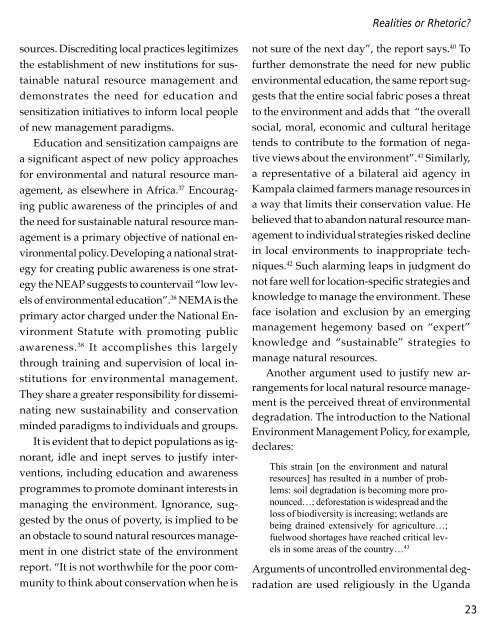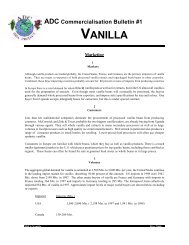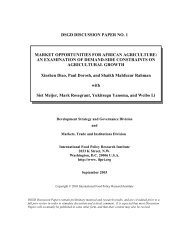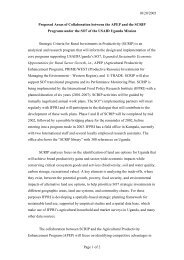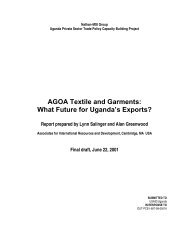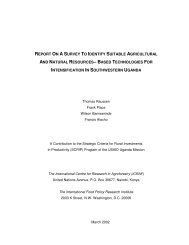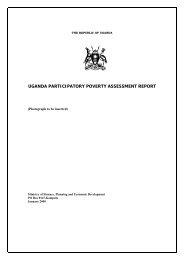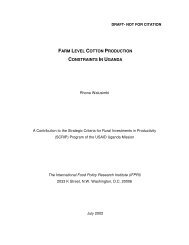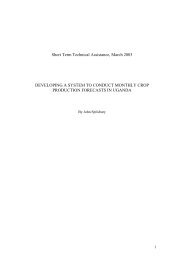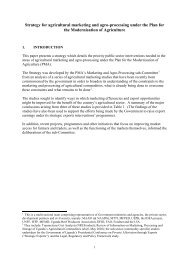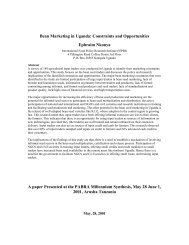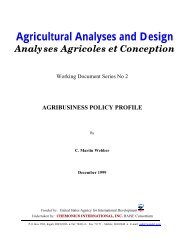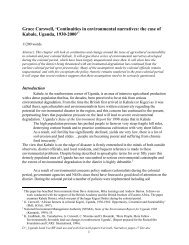Decentralisation in Uganda Rhetoric-Chapter3. - Foodnet
Decentralisation in Uganda Rhetoric-Chapter3. - Foodnet
Decentralisation in Uganda Rhetoric-Chapter3. - Foodnet
You also want an ePaper? Increase the reach of your titles
YUMPU automatically turns print PDFs into web optimized ePapers that Google loves.
sources. Discredit<strong>in</strong>g local practices legitimizes<br />
the establishment of new <strong>in</strong>stitutions for susta<strong>in</strong>able<br />
natural resource management and<br />
demonstrates the need for education and<br />
sensitization <strong>in</strong>itiatives to <strong>in</strong>form local people<br />
of new management paradigms.<br />
Education and sensitization campaigns are<br />
a significant aspect of new policy approaches<br />
for environmental and natural resource management,<br />
as elsewhere <strong>in</strong> Africa. 37 Encourag<strong>in</strong>g<br />
public awareness of the pr<strong>in</strong>ciples of and<br />
the need for susta<strong>in</strong>able natural resource management<br />
is a primary objective of national environmental<br />
policy. Develop<strong>in</strong>g a national strategy<br />
for creat<strong>in</strong>g public awareness is one strategy<br />
the NEAP suggests to countervail “low levels<br />
of environmental education”. 38 NEMA is the<br />
primary actor charged under the National Environment<br />
Statute with promot<strong>in</strong>g public<br />
awareness. 38 It accomplishes this largely<br />
through tra<strong>in</strong><strong>in</strong>g and supervision of local <strong>in</strong>stitutions<br />
for environmental management.<br />
They share a greater responsibility for dissem<strong>in</strong>at<strong>in</strong>g<br />
new susta<strong>in</strong>ability and conservation<br />
m<strong>in</strong>ded paradigms to <strong>in</strong>dividuals and groups.<br />
It is evident that to depict populations as ignorant,<br />
idle and <strong>in</strong>ept serves to justify <strong>in</strong>terventions,<br />
<strong>in</strong>clud<strong>in</strong>g education and awareness<br />
programmes to promote dom<strong>in</strong>ant <strong>in</strong>terests <strong>in</strong><br />
manag<strong>in</strong>g the environment. Ignorance, suggested<br />
by the onus of poverty, is implied to be<br />
an obstacle to sound natural resources management<br />
<strong>in</strong> one district state of the environment<br />
report. “It is not worthwhile for the poor community<br />
to th<strong>in</strong>k about conservation when he is<br />
Realities or <strong>Rhetoric</strong>?<br />
not sure of the next day”, the report says. 40 To<br />
further demonstrate the need for new public<br />
environmental education, the same report suggests<br />
that the entire social fabric poses a threat<br />
to the environment and adds that “the overall<br />
social, moral, economic and cultural heritage<br />
tends to contribute to the formation of negative<br />
views about the environment”. 41 Similarly,<br />
a representative of a bilateral aid agency <strong>in</strong><br />
Kampala claimed farmers manage resources <strong>in</strong><br />
a way that limits their conservation value. He<br />
believed that to abandon natural resource management<br />
to <strong>in</strong>dividual strategies risked decl<strong>in</strong>e<br />
<strong>in</strong> local environments to <strong>in</strong>appropriate techniques.<br />
42 Such alarm<strong>in</strong>g leaps <strong>in</strong> judgment do<br />
not fare well for location-specific strategies and<br />
knowledge to manage the environment. These<br />
face isolation and exclusion by an emerg<strong>in</strong>g<br />
management hegemony based on “expert”<br />
knowledge and “susta<strong>in</strong>able” strategies to<br />
manage natural resources.<br />
Another argument used to justify new arrangements<br />
for local natural resource management<br />
is the perceived threat of environmental<br />
degradation. The <strong>in</strong>troduction to the National<br />
Environment Management Policy, for example,<br />
declares:<br />
This stra<strong>in</strong> [on the environment and natural<br />
resources] has resulted <strong>in</strong> a number of problems:<br />
soil degradation is becom<strong>in</strong>g more pronounced…;<br />
deforestation is widespread and the<br />
loss of biodiversity is <strong>in</strong>creas<strong>in</strong>g; wetlands are<br />
be<strong>in</strong>g dra<strong>in</strong>ed extensively for agriculture…;<br />
fuelwood shortages have reached critical levels<br />
<strong>in</strong> some areas of the country… 43<br />
Arguments of uncontrolled environmental degradation<br />
are used religiously <strong>in</strong> the <strong>Uganda</strong><br />
23


